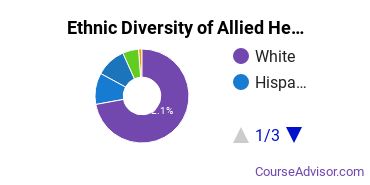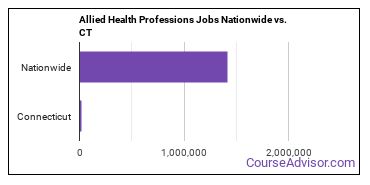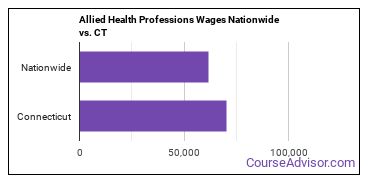Allied Health Schools in Connecticut
In 2022-2023, 797 students earned their Allied Health degrees in CT.
As a degree choice, Allied Health is the 10th most popular major in the state.
Featured Allied Health Professions Programs
Learn about start dates, transferring credits, availability of financial aid, and more by contacting the universities below.
Take your associate degree in an allied health field to the next level with this specialized transfer friendly online bachelor of science from Southern New Hampshire University.
Featured Allied Health Professions Programs
Learn about start dates, transferring credits, availability of financial aid, and more by contacting the universities below.
Take your associate degree in an allied health field to the next level with this specialized transfer friendly online bachelor of science from Southern New Hampshire University.
Education Levels of Allied Health Majors in Connecticut
Allied Health majors in the state tend to have the following degree levels:
| Education Level | Number of Grads |
|---|---|
| Master’s Degree | 300 |
| Associate Degree | 219 |
| Bachelor’s Degree | 198 |
| Award Taking 1 to 2 Years | 63 |
| Award Taking 2 to 4 Years | 63 |
| Award Taking Less Than 1 Year | 17 |
Gender Distribution
In Connecticut, a allied health major is more popular with women than with men.

Racial Distribution
The racial distribution of allied health majors in Connecticut is as follows:
- Asian: 5.5%
- Black or African American: 6.4%
- Hispanic or Latino: 12.8%
- White: 68.1%
- Non-Resident Alien: 1.3%
- Other Races: 5.9%

Jobs for Allied Health Grads in Connecticut
In this state, there are 14,140 people employed in jobs related to an allied health degree, compared to 1,414,230 nationwide.

Wages for Allied Health Jobs in Connecticut
A typical salary for a allied health grad in the state is $70,410, compared to a typical salary of $61,540 nationwide.

Most Popular Allied Health Programs in CT
There are 10 colleges in Connecticut that offer allied health degrees. Learn about the most popular 10 below:
It takes the average student 4.07 years to graduate. Of all the teachers who work at the school, 33% are considered full time. 100% of students are awarded financial aid at this school.
Request Information36% of the teachers are full time. This private institution charges an average net price of $39,682. Students enjoy a student to faculty ratio of 11 to 1.
Request InformationThe student to faculty ratio is 6 to 1. Most students complete their degree in 4.12 years. 59% of students get financical aid.
Request InformationThe average student takes 4.19 years to complete their degree at UHart. Of all the teachers who work at the school, 44% are considered full time. 8 to 1 is the student to faculty ratio.
Request Information100% of students are awarded financial aid at this school. 14 to 1 is the student to faculty ratio. Most students complete their degree in 4.27 years.
Request InformationThe full-time teacher rate is 95%. 100% of students are awarded financial aid at this school. The average student takes 4.11 years to complete their degree at USJ.
Request InformationThe full-time teacher rate is 66%. Students enjoy a student to faculty ratio of 16 to 1. The average student takes 4.16 years to complete their degree at UCONN.
Request InformationAllied Health Careers in CT
Some of the careers allied health majors go into include:
| Job Title | CT Job Growth | CT Median Salary |
|---|---|---|
| Athletic Trainers | 15% | $56,280 |
| Cardiovascular Technologists and Technicians | 3% | $75,350 |
Related Majors in Connecticut
Below are some popular majors in the state that are similar to allied health.
| Major | Annual Graduates in CT |
|---|---|
| Nursing | 3,058 |
| Other Health Professions | 611 |
| Rehabilitation Professions | 391 |
| Allied Health Services | 390 |
| Public Health | 366 |
| Medicine | 293 |
| Mental & Social Health Services | 288 |
| Health/Medical Admin Services | 262 |
View all majors related to Allied Health
Explore Major by State
Alabama
Arkansas
Connecticut
Florida
Idaho
Iowa
Louisiana
Massachusetts
Mississippi
Nebraska
New Jersey
North Carolina
Oklahoma
Rhode Island
Tennessee
Vermont
West Virginia
View Nationwide Allied Health Report
References
More about our data sources and methodologies.







